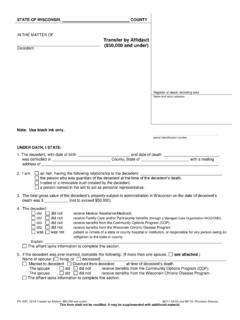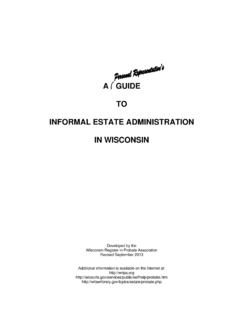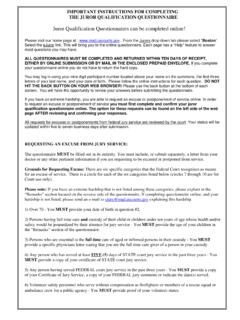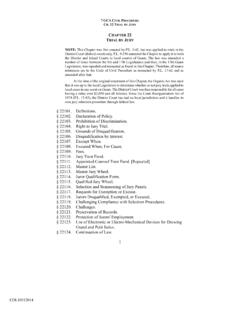Transcription of The Wisconsin Jury Handbook - wicourts.gov
1 THE Wisconsin JURY Handbook The material in this Handbook is general information only. Instructions will be given to you by the judge in each case and are controlling and must be followed. This Handbook is made available by the Director of State Courts and maintained by the Office of Court Operations. We hope it will assist prospective jurors in performing their duty and promote a better understanding of the Wisconsin jury system for the public. 2 INTRODUCTION You have been summoned to serve as a juror in the circuit courts of the State of Wisconsin .
2 This Handbook will generally explain your function as a juror and help you understand how trials are conducted. As a juror, you are performing one of the highest duties in our democratic system of government. You may experience problems and have questions, but there will always be people to assist you. Your service will be educational and should bring you a sense of great satisfaction and a feeling that you have contributed to our society. Unless you have a very serious conflict, you will be expected to serve as a juror. Each citizen has a stake in the court system.
3 Someday you may be involved in a court case and you will want people like you to act as jurors in your case. Please note: If you have a disability that requires an accommodation by the court to allow you to serve as a juror, please contact either the clerk of circuit court or the Americans with Disabilities Act Coordinator in the county where you are called to serve, as soon as possible. 3 LENGTH OF SERVICE Under Wisconsin law, jurors are eligible for up to five (5) days of service within a one month period or until the case they are serving on is over. You may only be required to serve as a juror for one month in a four year period.
4 Some counties, however, have adopted a system known as "one day/one trial"*. Under this system a juror may only be asked to serve one day or until the case they are serving on is over. A citizen will be eligible to serve again after four years. A "day of service" means a day of attendance, not necessarily of actual service on a jury panel. Often the days will not be in succession. If you are selected for a jury panel, you will serve until that case is done. If you are not selected, you are usually excused within one to two hours and will probably be asked to return on another day.
5 Most trials last only one day. When a trial does last longer, the judge usually adjourns so that you can return home each day at a reasonable hour. In many counties you will not be summoned to a specific case, but will be asked to appear as part of a larger jury pool. You may be assigned to participate in voir dire (pronounced vwor deer) for one case before one judge, and, if not selected, assigned to another case before a different judge. Once summoned to serve as a potential juror you will receive more detailed information regarding parking, time to appear, and maybe additional information regarding how to find out whether you should report as summoned.
6 DELAYS Resolving legal disputes is complex and can be unpredictable. Often, cases are settled at the very last minute. When the jury is ready to hear the case the parties often work out a last minute compromise, called a settlement , rather than gamble on what the jury will decide. If a case settles, usually you will not be told what the settlement is, as you may have to hear a similar case later and should not be influenced by what was worked out in a different case. These settlements may seem very inconvenient to you, especially if you are at the 5 DAYS ONE DAY/ONE TRIAL *Underlined words are explained further in the Definitions section.
7 DAY OF SERVICE COUNTY-SPECIFIC INFORMATION 4 courthouse waiting, but settlements usually save your time, that of the trial participants, and taxpayer money. There may also be delays during the trial: witnesses may not have arrived; the judge may have to answer a legal question, which if heard by the jury might influence their decision; discussions about what testimony may be presented to the jury; or there may just need to be a break by all the participants from the intense concentration required during the trial. Whatever the reason, delays sometimes save time.
8 Rest assured, the judge understands the inconvenience and annoyance caused by long delays and will try to keep these to a minimum. TYPES OF CASES There are basically two types of cases - criminal and civil. In a criminal case the plaintiff seeks to convict a party accused of committing a crime, violating a state statute, or violating a county, city or village ordinance. The party accused of committing the crime is called a defendant. In a criminal case where the party is accused of violating a state statute, the plaintiff is the State of Wisconsin and is represented by the district attorney or by an assistant district attorney.
9 In a case involving a violation of a county, city, or village ordinance, the plaintiff may be represented by the district attorney, assistant district attorney, or another attorney hired by the government. The jury in a criminal case decides if the defendant is guilty or not guilty as to each charge or count against the defendant. The penalty, if any, is the sole responsibility of the judge and should not concern you as a juror. In a criminal case, the defendant is presumed innocent unless proven guilty "beyond a reasonable doubt." If the charge has not been proven beyond a reasonable doubt, then you must find the defendant not guilty.
10 If the charge has been adequately proven then you should find the defendant guilty. Traffic offenses and ordinance violations may also be presented to a jury. In all of these trials, the jury also decides whether the defendant is guilty or not guilty of each charge. Civil cases result from disagreements between two or more DELAYS CAN SAVE TIME AND MONEY CRIMINAL CASES INNOCENT UNLESS PROVEN GUILTY TRAFFIC AND ORDINANCE OFFENSES 5 parties and may include actions relating to marriage, real estate, contracts, injuries, and money. The plaintiff is the party who starts the lawsuit by filing a complaint.















